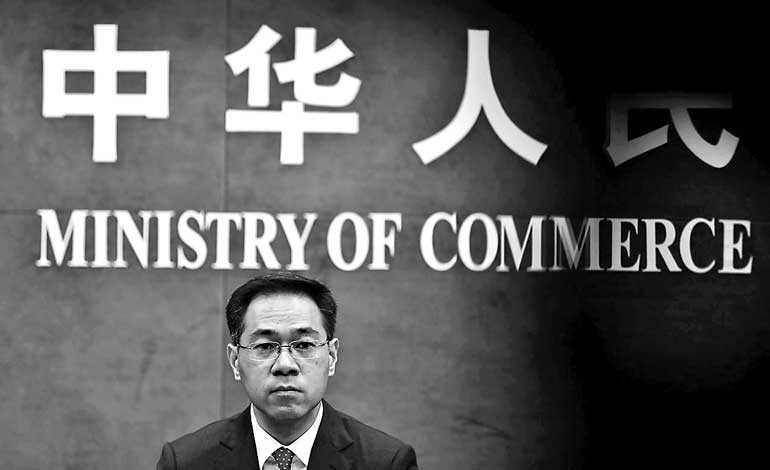Thursday Feb 19, 2026
Thursday Feb 19, 2026
Saturday, 9 November 2019 00:04 - - {{hitsCtrl.values.hits}}

China’s Ministry of Commerce spokesperson Gao Feng attends a news conference at the commerce ministry in Beijing, China – Reuters
Washington/Beijing (Reuters): China and the United States have agreed to roll back tariffs on each other’s goods in a “phase one” trade deal if it is completed, officials from both sides said on Thursday, sparking division among some advisers to President Donald Trump.
The Chinese Commerce Ministry, without laying out a timetable, said the two countries had agreed to cancel the tariffs in phases.
A US official, speaking on condition of anonymity, confirmed the rollback would be part of the first phase of a trade agreement that is still being put to paper for Trump and President Xi Jinping to sign.
White House spokeswoman Stephanie Grisham told Fox News Channel the United States is “very, very optimistic” about completing a deal that would defuse a 16-month trade war between the world’s two largest economies.
“I cannot get ahead of the talks with China, but we are very, very optimistic that we will reach a deal soon,” she said.
White House trade adviser Peter Navarro, however, said in an interview with Fox Business Network “There is no agreement at this time to remove any of the existing tariffs as a condition of the phase one deal.”
“They’re just negotiating in public, trying to push this in a direction,” Navarro said of reports he said were put out by “Chinese propaganda press.”
Experts warn the pact could still fall apart. US officials said a lot of work remained to be done when Trump announced the outlines of an interim deal last month.
Trump has used tariffs on billions of dollars of Chinese goods as his primary weapon in the protracted trade war. The prospect of lifting them, even in phases, has drawn fierce opposition from advisers in and outside of the White House who remain wary of giving up a key aspect of US leverage.
US stocks pared gains after Reuters reported that the plan faced internal opposition.
“There is no specific agreement for a phased rollback of the tariffs,” said Michael Pillsbury, an outside adviser to Trump.
“The American side has been ambiguous when and which tariffs will be lifted. The Chinese have some wishful thinking and are trying to soothe their domestic hardliners that the tariffs will someday come off.”
If an interim deal is finished and signed, it is widely expected to include a US pledge to scrap tariffs scheduled for Dec. 15 on about $156 billion worth of Chinese imports, including cell phones, laptop computers and toys.
Tariff cancellation was an important condition for any agreement, Chinese Commerce Ministry spokesman Gao Feng said, adding that both must simultaneously cancel some tariffs on each other’s goods to reach the phase one pact.
“Both sides have agreed to cancel additional tariffs in different phases, as both sides make progress in their negotiations,” Gao told a regular briefing.
A spokesman for the U.S. Treasury department declined to comment and the US Trade Representative’s office did not immediately respond to a request for comment.
Republican lawmakers are urging the Trump administration to tie any tariff rollbacks to Beijing’s compliance with specific elements of the agreement.
“The tariffs should be phased out piece by piece as China complies,” one congressional source said.